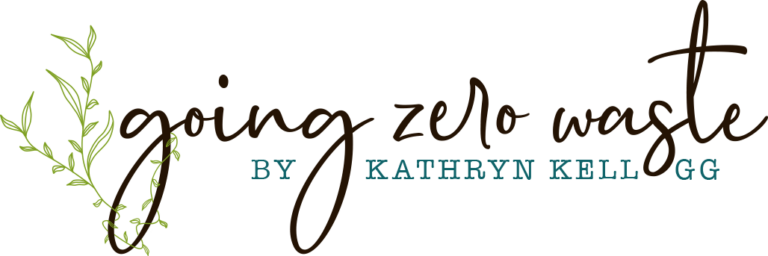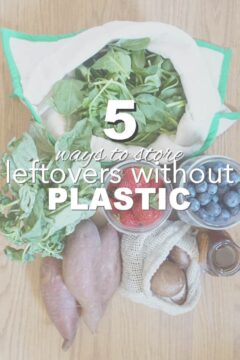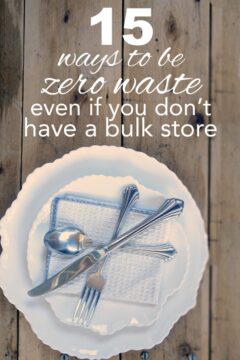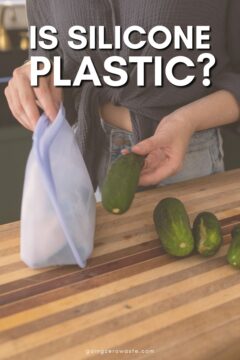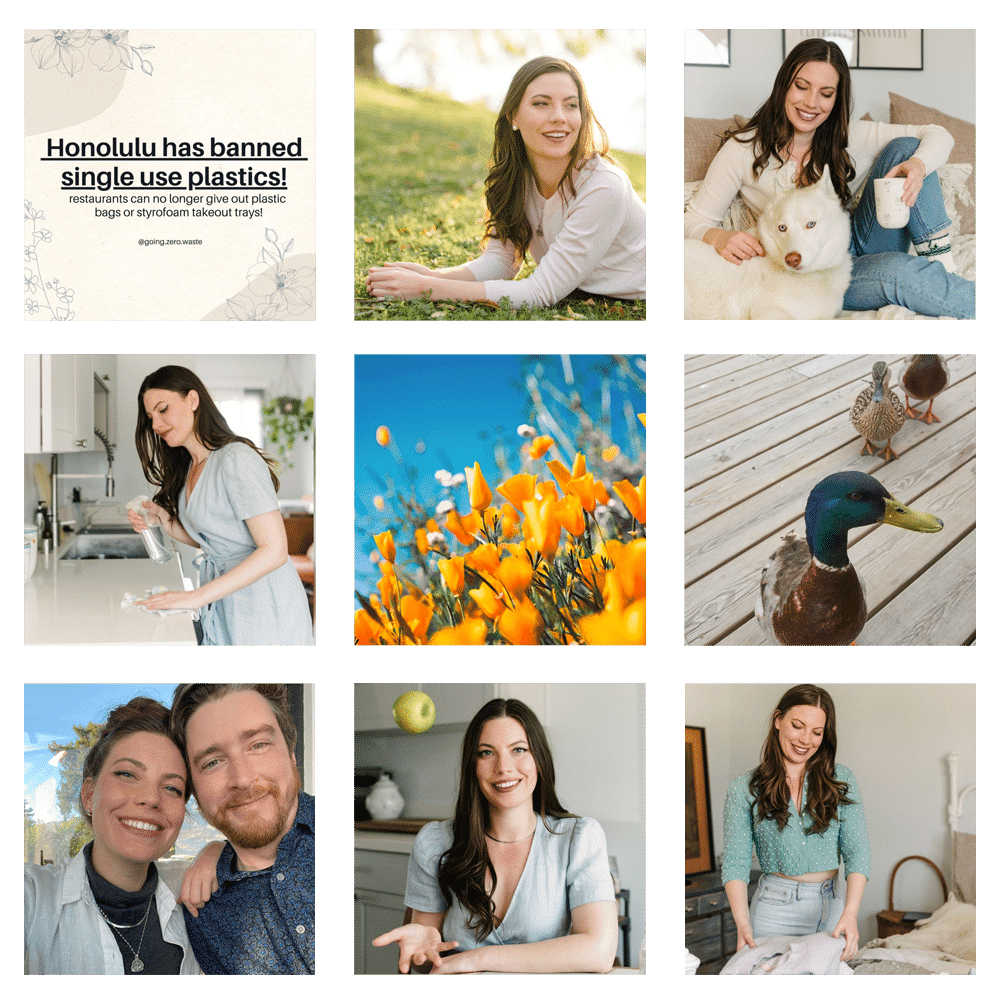Bored Cow: What Is Animal Free Dairy Milk + Should You Try It?
Zero Waste Kitchen
October 3, 2022 | Kathryn Kellogg
Last Updated on December 4, 2023
Bored Cow offers a unique, animal free dairy that’s different from almond or soy milk. But is this plant-based milk any good?
Bored Cow milk offers real milk protein for all of the benefits of milk, without the harmful environmental impact or issues that lactose brings for many people. My Bored Cow milk review will cover ingredients, flavors, taste, and environmental impact so you know everything you need to know before trying it! Read on for my full Bored Cow review.
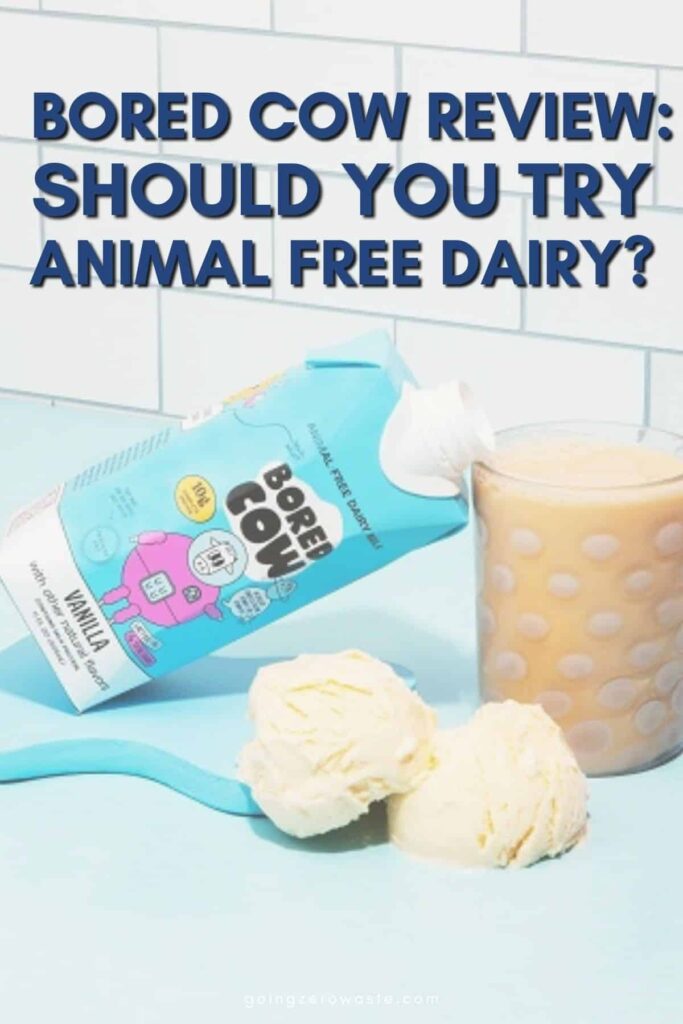
Disclaimer: I Invested in the company Bored Cow, but all thoughts and opinions are my own.
Table of Contents
bored cow milk
I’m that girl who loves making her own almond milk from scratch and reusing the almond pulp to make something new. I mean, have you ever tried almond pulp crackers?
Eating plant based is a big part of my life, and for good reason: A global shift to a plant-based diet could reduce mortality and greenhouse gases caused by food production by 10% and 70%, respectively, by 2050.
Did you know 57% of global greenhouse gas emissions come from the meat and dairy industry? Beef in particular is the largest greenhouse gas emitter by 25%.
With this said, I think it’s important to acknowledge not everyone can give up meat and dairy products. Be it due to lack of affordable options, specific dietary needs, or several other factors, many people simply can’t make the switch.
Thing is, while it’s been easy for me to remove meat and dairy from my meals, Justin has found it a bit harder. His main gripe is with the taste of plant milks: He just doesn’t like the flavor or texture, compared to the real thing.
That’s where Bored Cow milk comes in to play. Unlike most other plant milks, Bored Cow tastes exactly like the real thing, minus the cow. It’s an animal-free dairy milk that’s made using plant-based ingredients. And Justin can’t get enough of it.
If you’re craving that real-milk flavor and taste, but don’t want to support the dairy industry anymore, Bored Cow is for you! Here’s my Bored Cow review, including what animal-free dairy milk is, and why you should try it.
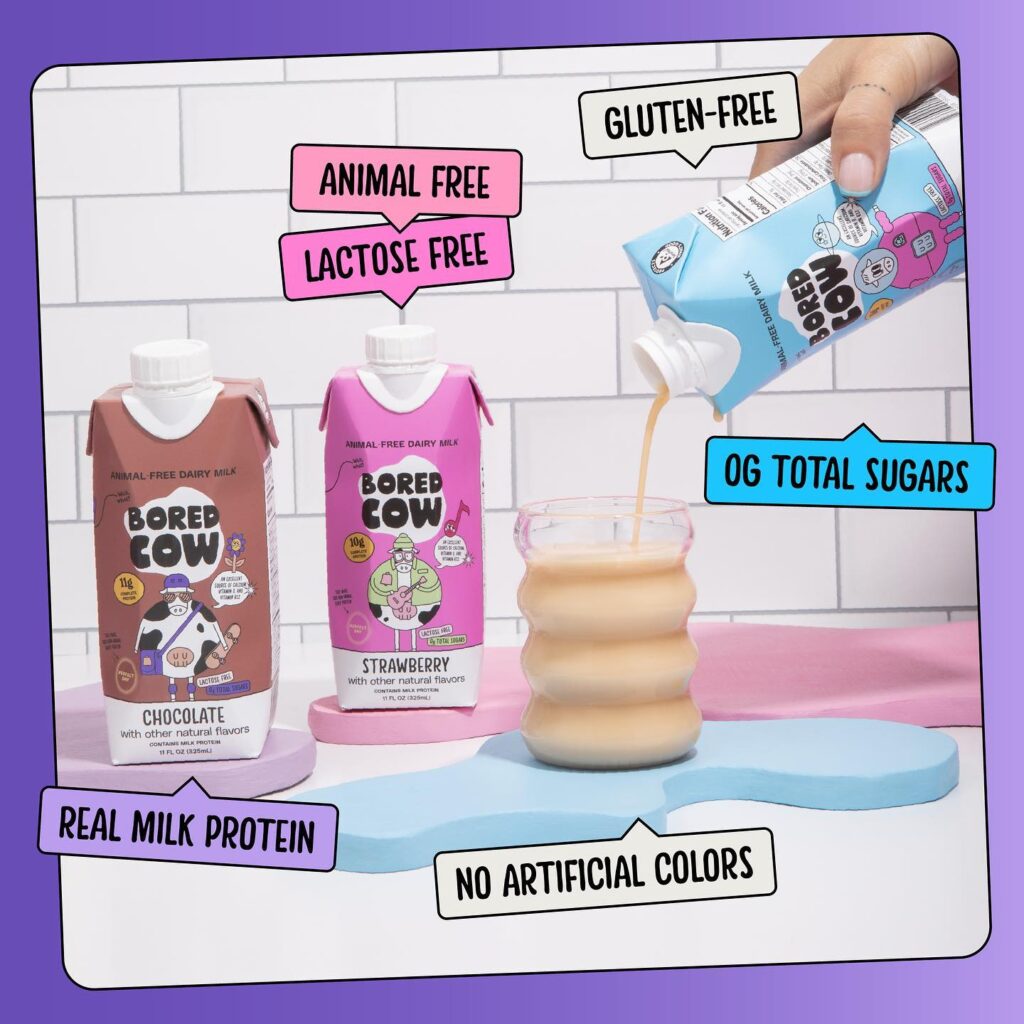
what is bored cow?
First and foremost, Bored Cow is the world’s first animal free dairy. They offer chocolate, vanilla, and strawberry milk. In partnership with Perfect Day, they’ve figured out how to make real milk protein with microflora instead of cows.
Then, Bored Cow combines that with plant-based ingredients to get that rich, creamy flavor of dairy. The result is vegan-friendly, lactose-free dairy with 0g of sugar per cup.
Bored Cow’s milk is also full of calcium, protein (10-11g in one cup), and vitamins A, D, and B12. Also, this brand’s flavored milks are free from antibiotics, lactose, gluten, nuts, and hormones.
However, please be advised that if you have a milk allergy, do not drink Bored Cow. The non-animal whey protein Bored Cow uses is identical to the whey protein found in traditional cow’s milk, so you’ll want to avoid it.
animal free dairy
Bored Cow doesn’t rely on cows for their dairy. Instead, Bored Cow utilizes genetically identical whey protein that is made using precision fermentation. This turns plant sugar into whey without needing cows.
The whey protein is made using microflora. Since this process doesn’t involve cows, it is an animal free version of dairy. However, the whey that is produced is identical to dairy in all other ways.
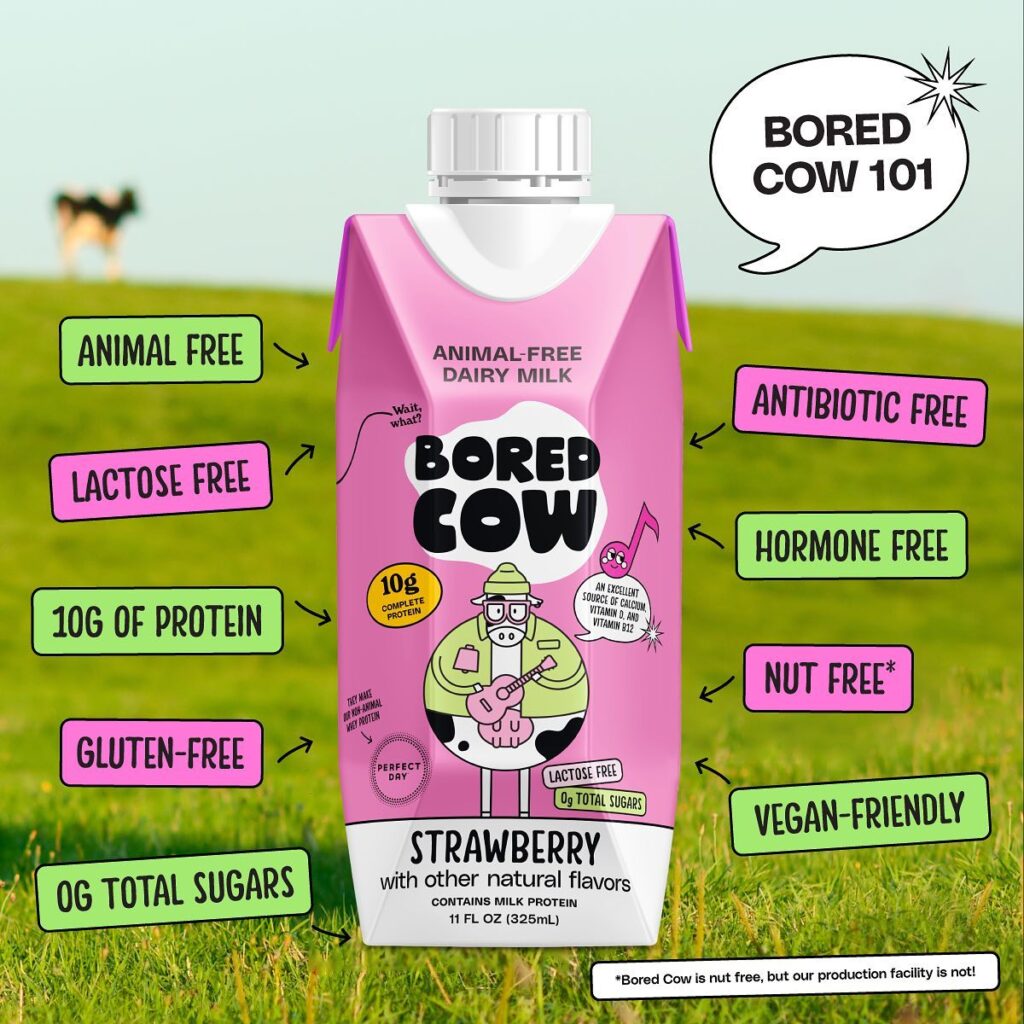
how the dairy industry harms the environment
Most conventional dairy comes from cows on factory farms. These cows are forced to live their lives in small, cramped spaces and are impregnated repeatedly to produce milk for humans (something that’s meant for her calf).
Aside from the inhumane treatment of these animals, factory farming also plays a huge role in the climate crisis. Waste from factory farms pollutes water, land, and air in neighboring communities.
On top of this, these facilities require massive amounts of energy and resources to run while also releasing a number of harmful emissions. Industrial animal agriculture generates more greenhouse gases than all the world’s transport combined.
In fact, the meat and dairy industries are responsible for 14% of greenhouse gas emissions. Cows, especially in large concentrations, produce a lot of methane (another potent greenhouse gas) through their burps.
The meat and dairy industries are the leading cause of deforestation — that’s because 77% of the world’s farmland is used for raising livestock. Dairy cattle need to eat 100 lbs of feed per day, so think about how much land that takes up.
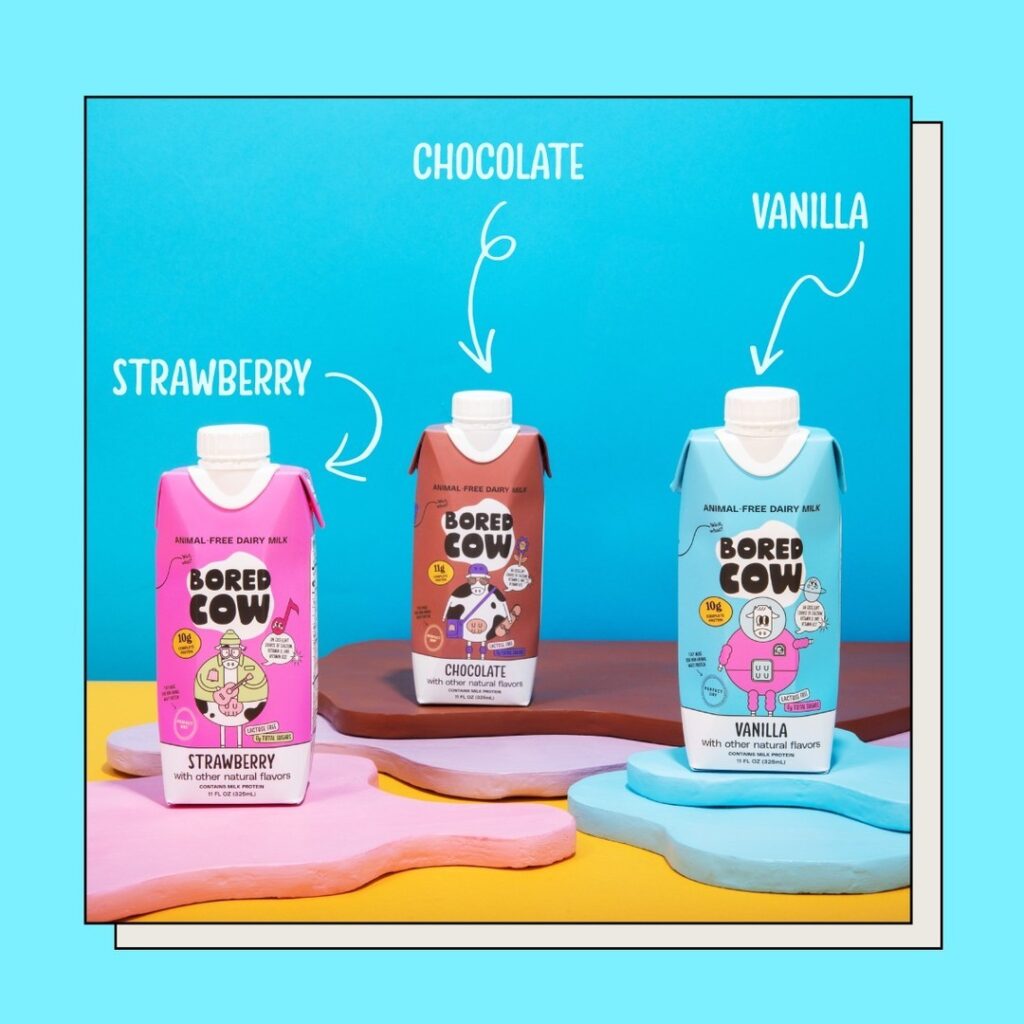
bored cow milk review:
Time for my official Bored Cow review! If you’re thinking of trying this animal-free dairy milk, here are some pros and cons you’ll want to consider first.
Pros:
- Animal-free, which means no factory farming and less carbon emissions
- Same creaminess as real milk
- Vegan friendly and cruelty-free
- Loaded with vitamins and nutrients
- Antibiotic-free
- Hormone-free
- Lactose-free
- Gluten-free
- 0g of sugar
- 9 essential amino acids
Cons:
- Packaging waste
- Contains milk allergen
- A bit pricey
As you can see, the pros far outweigh the cons. My biggest gripe is with the packaging of this product. You can only order a 12 or 24 pack, and they’re all individually packaged in cartons.
Did you know milk cartons are harder to recycle than plastic milk jugs? That’s because paper milk cartons are coated with a thin layer of polyethylene (PE) plastic.
Milk cartons need to be sent to a specialized mill where special chemicals can separate the paper fibers from the plastic. Only the paper layer is recycled, and the plastic layers and cap are typically not recycled.
I’d love to see Bored Cow get innovative with their packaging – maybe offering a closed loop glass bottle system that’s returnable (think milk-man)?
Or, perhaps one big jug made from recycled plastic. Bigger containers are easier to recycle than smaller ones, as they’re less likely to get lost in recycling facilities.
Either way, this is the biggest problem I have with them, and it’s one that can be improved on over time.
faqs
where can i get bored cow?
Their website, www.tryboredcow.com, offers a store locator where you can find a carrier near you. If there aren’t any local stores near you, you can order directly from their website and have it shipped to your home. However, I always recommend purchasing locally if you can. This reduces packaging waste and carbon emissions!
is bored cow vegan?
Yes, Bored Cow is vegan friendly because they require no animals to make their dairy. However, it is still 100% real dairy, due to real whey protein made from plant sugar and microflora. There are three flavors to choose from: vanilla, strawberry, and chocolate. If you have a milk allergy, Bored Cow milk is not for you.
does it need to be refrigerated?
This animal free milk is shelf stable, meaning it can be stored in your pantry until you’re ready to drink it. However, the website strongly recommends serving chilled because it simply tastes better cold!
So, what do you think of my Bored Cow review? Would you give this animal-free dairy milk a try? Let me know in the comments below!

